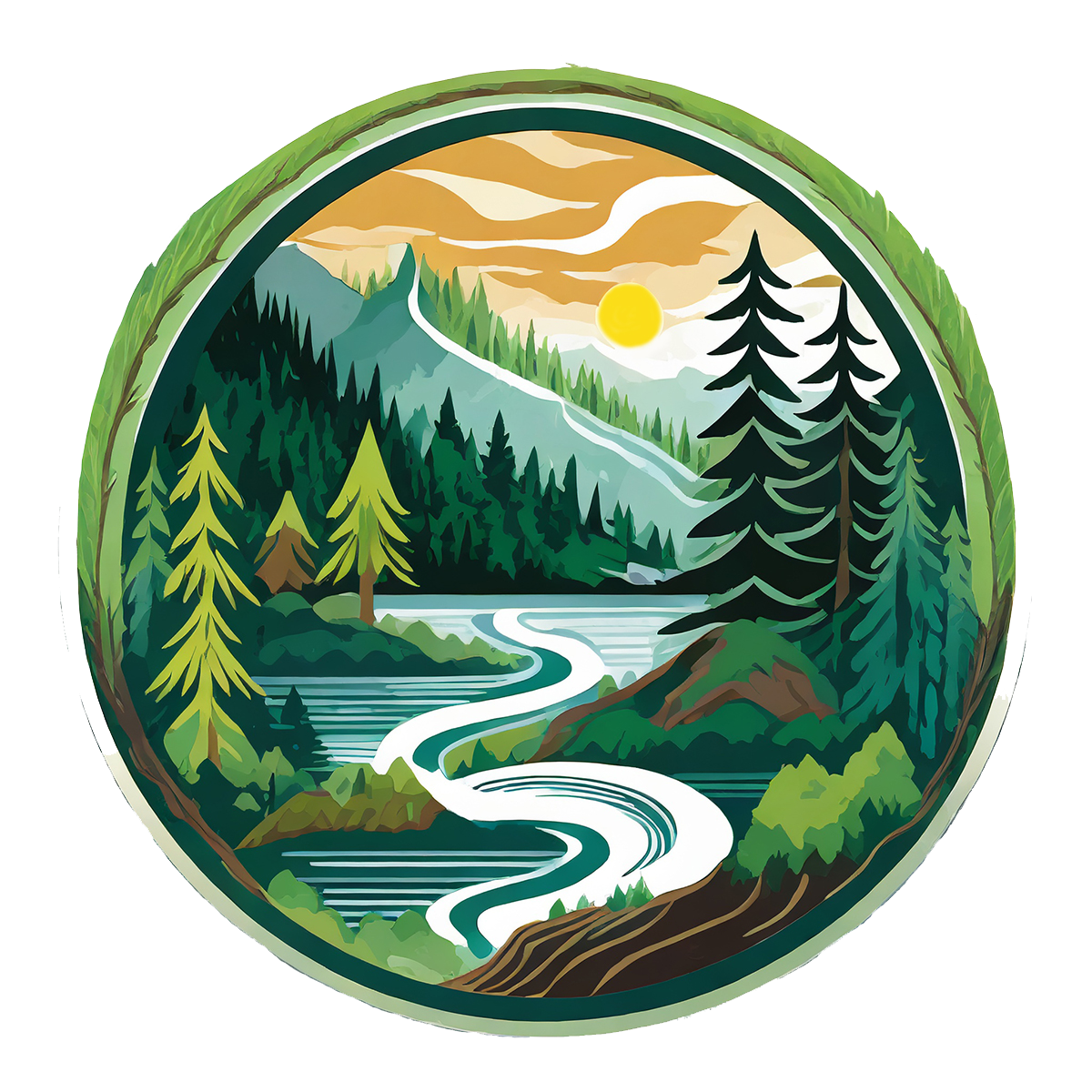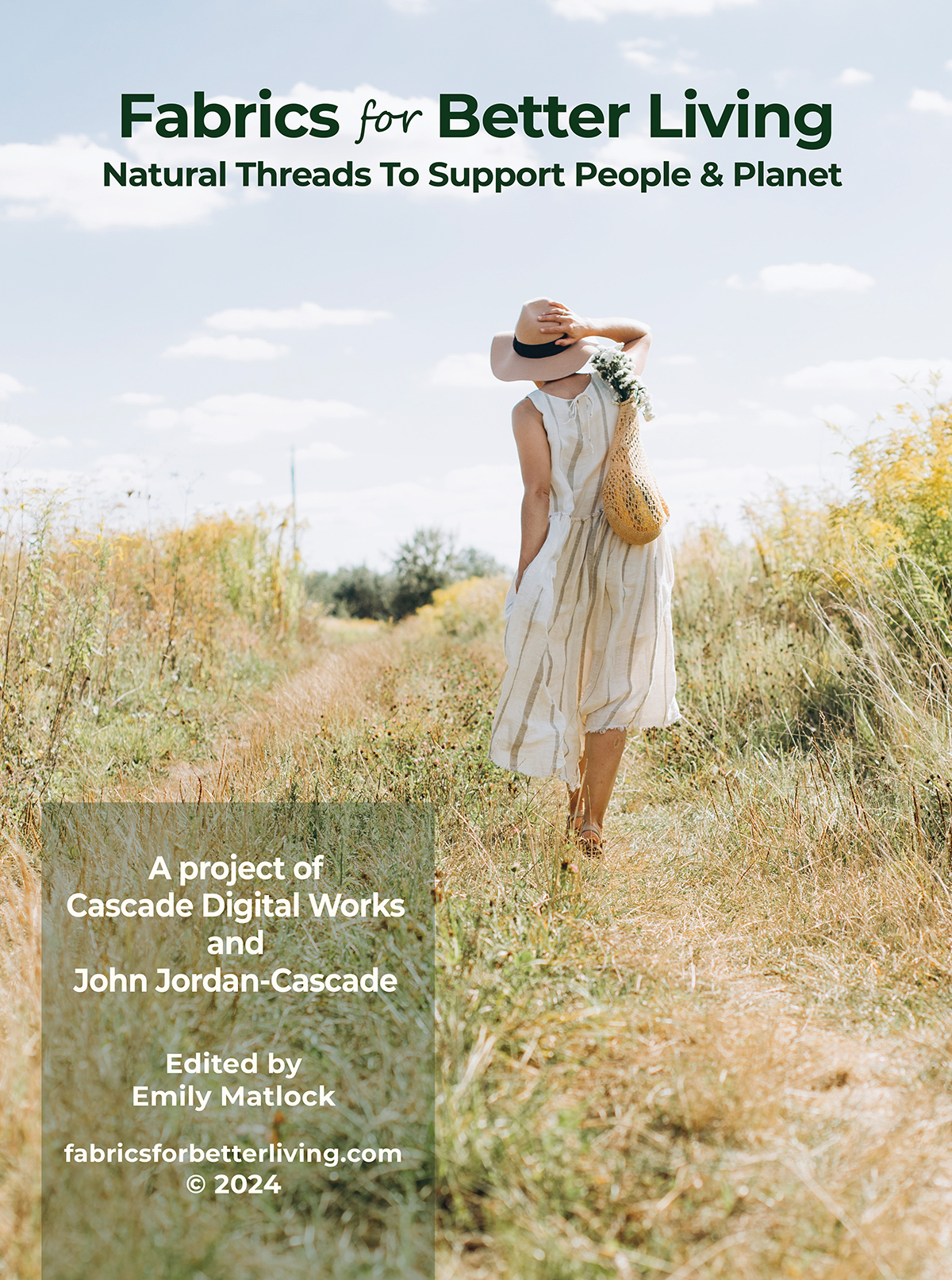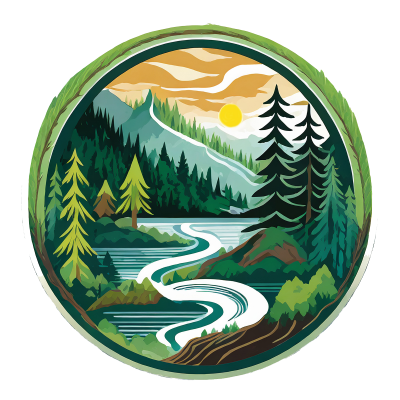NOW AVAILABLE FOR SALE AS AN AMAZON KINDLE DOWNLOAD!
A new project produced by Cascade Digital Works,
an online marketing and media production company
"Fabrics For Better Living: Natural Threads To Support People and Planet" delves into the fascinating world of natural fibers to uncover their myriad benefits, extending far beyond mere fashion statements. The book explores the environmental impact of five natural fibers: hemp, linen, bamboo, organic cotton, and wool. It will also showcase how their biodegradable nature and sustainable production processes are crucial in our search for better health and the fight against environmental degradation.
In the Health Benefits section, we unveil how natural fibers, like cotton, linen, and hemp, offer breath-ability and gentleness, crucial for those with sensitive skin or allergies, while enhancing overall comfort.
The chapter on Comfort and Ethical Choices highlights the aesthetic and ethical dimensions of natural fibers, illustrating their role in the sustainable and fair trade fashion movement.
Finally, Quality Indicators for the 5 Natural Fibers guide us in making informed choices that align with both our environmental and health-conscious values.
This book aims not only to inform but to inspire a shift towards a more sustainable, health-conscious wardrobe. Each time we choose clothing, it provides an opportunity to vote with our pocketbook; a vote for the work to create a better world. Government decision-makers, business leaders and entrepreneurs will also find value in this book as it sheds light on the economic viability and growth prospects of these natural fibers, encouraging business strategies that align with sustainability and ethical production.
Download the Kindle app to start reading from your PC or Mac.
Or download the book and start reading on your phone, tablet or Kindle e-reader (latest model, $99).
SOCIAL MEDIA TOOLKIT
DESCRIPTION:
"Fabrics For Better Living: Natural Threads To Support People and Planet" delves into the fascinating world of natural fibers to uncover their myriad benefits, extending far beyond mere fashion statements. The book explores the environmental impact of five natural fibers: hemp, linen, bamboo, organic cotton, and wool. It also showcases how their biodegradable nature and sustainable production processes are crucial in our search for better health and the fight against environmental degradation.
"Fabrics For Better Living: Natural Threads To Support People and Planet" is a project of Cascade Digital Works, an online marketing and media production company, and aims not only to inform but to inspire a shift towards a more sustainable, health-conscious wardrobe. Each time we choose clothing, it provides an opportunity to vote with our pocketbook; a vote for the work to create a better world. Government decision-makers, business leaders and entrepreneurs will also find value in this book as it sheds light on the economic viability and growth prospects of these natural fibers, encouraging business strategies that align with sustainability and ethical production.
There is also a chapter about the good work small, independent companies are doing to bring sustainable products to the consumer and includes a roundup of the work done by independent watchdog organizations to hold the fashion industry to higher standards for organic production and worker justice.
LINKS
Download the screen res book cover image (.jpg)
Download the hi-res book cover image (.jpg)
Use this link to buy the book as a downloadable kindle book on amazon.com:
https://www.amazon.com/dp/B0D9L3GT1S
Use this re-direct link to get to this page with more in-depth information:
FabricsForBetterLiving.com
Social Media Promotion
use these hashtags for promotion on social media:
#FabricsForBetterLiving
#OrganicClothing
#NaturalFabrics
#EthicalFashion
#SustainableFashion
#NaturalClothing
#HealthConsciousFashion
#SympaticoClothing
Download the Kindle app to start reading from your PC or Mac.
You can also download the book and start reading on your phone, tablet or Kindle e-reader (latest model, $99).

Data on the chemicals dumped into rivers and streams worldwide, can be challenging to compile comprehensively due to variations in regulations, reporting practices, and the global nature of the textile industry. Additionally, the discharge of chemicals into the aquifer, streams and rivers may occur at various stages of the supply chain, from textile production to garment manufacturing and laundering.
Numerous studies and reports* have highlighted the significant pollution caused by textile manufacturing, including the release of hazardous chemicals into waterways. Efforts to address this issue include stricter regulations, voluntary industry initiatives, and the adoption of more sustainable production practices, such as the use of non-toxic dyes and improved wastewater treatment technologies.
The environmental impact of the clothing industry
While the clothing industry utilizes various chemicals throughout the manufacturing process, including dyes, solvents, finishing agents, and detergents, the details of the cost to our planet is beyond the scope of this book. For now, we as individual consumers, can seek to mitigate the impact of this industry by choosing organic whenever possible (see the last chapter of the book for companies that are making a difference), advocating for cleaning up our industrlal processes and supporting local artisans who make clothing whenever possible.
Background
Common hazardous substances used in clothing production include:
Azo dyes: These synthetic dyes are commonly used in textile dyeing but can release aromatic amines, some of which are known carcinogens, when they degrade. Azo dyes have been found in wastewater from textile factories.
Formaldehyde: Used as a wrinkle-resistant finish, formaldehyde is a known human carcinogen and can cause skin irritation and respiratory issues.
Chlorinated solvents: These are used in various stages of textile production, including cleaning and degreasing. They can persist in the environment and have harmful effects on aquatic life.
Heavy metals: Certain heavy metals like lead, cadmium, and chromium are used in textile dyes and finishes. They can be toxic to humans and ecosystems, accumulating in sediments and organisms.
Phthalates: Used in plasticizers for synthetic materials, phthalates can leach from textiles and contribute to water pollution. They have been linked to hormone disruption and other health issues.
Per- and polyfluoroalkyl substances (PFAS): Used in water-repellent finishes, PFAS are persistent chemicals that can accumulate in the environment and bioaccumulate in organisms. They have been associated with various health concerns.

Photo by cottonbro studio
* Three of the better-known and recent studies that have highlighted the pollution caused by textile manufacturing:
"Pulse of the Fashion Industry" by Global Fashion Agenda and Boston Consulting Group: This report, first published in 2017 and updated periodically, provides an in-depth analysis of the environmental and social impacts of the fashion industry, including pollution from textile manufacturing. It offers insights into areas such as water pollution, chemical use, and waste generation, highlighting the need for sustainability initiatives in the sector.
"Dirty Fashion: An Update on Pollution from the Global Fashion Industry" by Changing Markets Foundation: Published in 2020, this report investigates the environmental footprint of the fashion industry, with a focus on pollution from textile manufacturing. It examines the discharge of hazardous chemicals into waterways by textile factories and identifies key areas for improvement in the industry's environmental performance.
"River Blue" documentary by David McIlvride and Roger Williams: While not a traditional study, this documentary film released in 2016 sheds light on the environmental impact of the fashion industry, particularly on rivers and waterways. It follows river conservationist Mark Angelo as he travels to some of the world's most polluted rivers, revealing the role of textile manufacturing in water pollution and advocating for sustainable practices in the fashion sector.
These studies and documentary provide valuable insights into the environmental challenges associated with textile manufacturing, including the release of hazardous chemicals into waterways, and advocate for more sustainable approaches within the fashion industry.
Photo Credits:
Organic shirts
courtesy of dreamstime.com
Woman and man in grass field
Photo by cottonbro studio

Style is a way to say who you are without having to speak. ~ Rachel Zoe
Northwest Light Therapy is an educational project of Cascade Digital Works © 2024
Northwest Light Therapy website is offered as a source of health and wellness information. The content provided by Cascade Digital Works, LLC, is for informational purposes only and is not intended as medical advice. As such, the information provided is not a substitute for professional medical advice, diagnosis, or treatment. Users are encouraged to consult a healthcare provider for any medical concerns.
Privacy Policy
We respect your privacy. We do not share your personal information with any individual, business or government agency. Ever.


